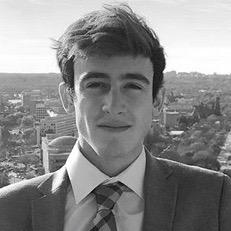
Ofer Newman and Liana Merom Asif are two Israelis who made time to meet me for coffee last week. We had just left the Israeli Consulate in New York, where Ofer and Liana educated a handful of American Jews on Israeli Gay Youth (IGY), an organization that seeks to offer a “social space” for young LGBT Israelis, many of whom find themsleves in oppressive environments. Cars screeched by and jackhammers pounded into the pavement, but from our conversation, I was able to catch deeper insight into the world of “queer Israel”– the good, the bad, and the uncertain.
Ofer is the CEO of IGY, a job he took after serving as the senior advisor to now Israeli President Isaac Herzog, who was then the leader of the opposition in the Knesset. Liana, a former combat soldier in the IDF, is the Vice President of IGY. Both were active members of Hashomer Hatzair, a socialist, Zionist and secular youth movement that dates back to Mandatory Palestine. This no doubt informs the progressive angle on Israeli social issues they both expressed. IGY began in 2002 as an underground operation in Tel Aviv, but now has over 400 volunteers and over 4,000 youth participants in ongoing activities throughout the year. Such activities include weekly meetings, marching in the Tel Aviv Pride Parade, researching LGBT issues in Israel (such as the “situation” of gay men in the IDF), and attending workshops and lectures with the goal of making social spaces more “inclusive, egalitarian, and empowering.” IGY is currently working with the Ministry of Welfare and Employment to establish a training center where “at risk” Israeli LGBT youth can earn a degree in a specific skill after their military service.
Ofer and Liana tell me they’re shocked “on a daily basis” by the stories of the children who walk into IGY’s doors, a number of them being homeless. One girl was sleeping for nights on end in the women’s section of a local synagogue after coming out as lesbian to her father. Both acknowledged the iconoclasm of Israel in comparison to its Middle Eastern neighbors when it comes to rights for sexual minorities, but also acknowledged the two communities which continue to stall on such liberalism — Orthodox Jews and Israel’s Arab community. IGY promises an accepting home for young people, many of whom are in these two circles.
Not only does IGY champion LGBT rights, but also relationships between those who are consistently portrayed as enemies. Perhaps outcasts from societal factions can bridge divides more successfully than politicians and legislation.
As a result, not only does IGY champion LGBT rights, but also relationships between those who are consistently portrayed as enemies. Perhaps outcasts from societal factions can bridge divides more successfully than politicians and legislation.
“We like to say that around our Shabbat tables, we host all of Israeli society,” Liana explained. “We can use our identity to fix things not just related to LGBT issues, for example Jewish and Arab relations. During our seminars, everything is in Hebrew and Arabic. We celebrate all holidays together. We are tackling the idea of how to combine queer identity and religion, and we tackle problems in small communities. This, I think, is a way to make Israeli society not only diverse, because we’re not only living next to each other, but we’re friends with each other, so we are building a society that is together. ”
I asked Ofer and Liana about their upbringings, in the hope of hearing of how their experiences shaped their activism. Ofer grew up on a Kibbutz in the north, a tight-knit community of almost seven-hundred people. “Everyone knew everything about everyone,” he says, “and for me, this was an incentive to come out of the closet pretty soon. I realized everyone was already talking and thinking.” Ofer recalls visiting his childhood Kibbutz after beginning his work with IGY as very emotional. He met with his former Kindergarten teacher and friends of his parents to describe living as a gay man in Israeli society, a universe still very far away for most Kibbutzniks. Liana grew up in Jerusalem, “the city where everything happens,” and was inspired to begin work in social activism after seeing her community fall short in regards to how young LGBT people are treated.
The perspective I heard over iced Americanos was one of optimism, passion, but also of grievance. As much as Israeli society is known for its celebration of love in the infamous gay bars of Tel Aviv, so also are the walls of reality–the unsustainable occupation of the West Bank, the blatant homophobia of the religious right, and the violence between Jews and Arabs– closing in.
“The work that we do,” Ofer noted, “applies not only to our participants. They go back to their homes, they go back to their communities, they go back to their synagogues, to their mosques–and they create a change. Because they’re more in love with themselves. And as RuPaul says, if you can’t love yourself, how the hell are you going to love someone else?”
After thanking Ofer and Liana for their time and stepping back into midtown traffic, I looked back on the two Israelis staring into the epicenter of Diaspora Jewry. I wondered if New York City feels alluring to gay people from Israel, where the collision of often conflicting identity is baked into their society. I decided I do not want to believe this, simply because the Zionist project calls for a Jewish and democratic state. In order to fulfill this dream, LGBT Jews in our ancestral homeland need boots on the ground.
Blake Flayton is New Media Director and columnist at the Jewish Journal.























 More news and opinions than at a Shabbat dinner, right in your inbox.
More news and opinions than at a Shabbat dinner, right in your inbox.